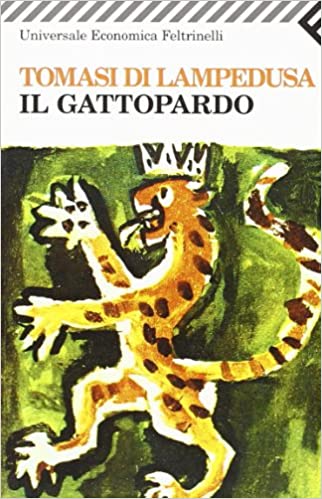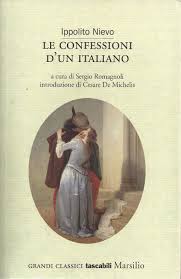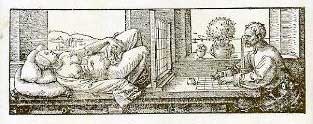
I seldom enjoy recent popular books, even less those that have been made into movies. I found in L'amica geniale a notable exception.
It is of the genre of Bildungsroman, stories of growth, for which I have a special affinity. It is very understated, unpreachy, and tender.
It recounts the growth not only of the narrator, but of her closent friend. At the start, the two young girls are close friends and almost indistiguishable in their natures and characters. As they grow into adolescence and marriage, their paths diverge, but they still remain the closest friends.
At the same time, the world orbiting around the two girls brings its own events and changes. The writer's parents consider her schooling a waste of time but are proud of her success in it. The girls themselves are entranced with novelties such as television and convertible cars, but after all is said and done, they are doubtful of the importance of the new things in comparison to the pulls of marriage, family, work and community.
I would think that just about anyone would enjoy this tale. I certainly did.

I was truly sorry to see this volume come to its end. Fortunately, there are two more volumes left for me to read.
I can't quite put into words what it is that I find so appealing about this series. But many others feel as I do.

Il gattopardo tells of the lives of Don Fabrizio, head of an ancient family of the minor nobility in Sicily, and of those around him. As his life moves on to its close, so do the old era and society fade during the Risorgimento.
As the book opens Don Fabrizio is hanging on to his estate and rank, though the former has fallen into decay and the latter descended into near-poverty and prerogatives only of title and ceremony. By the time the story ends, he has died and a new generation has moved in under Garibaldi. His dog, which was stuffed and retained when the animal died, has become infested with vermin and smelly – and is thrown out. A bishop comes to examine the relics and images in the family chapel, coming to the conclusion that nearly all are fake.
I am a consistent fan of the Bildungsroman genre, where a younger character becomes a mature one. In a way, Il gattopardo is like that: it tells the story of how life changes over time, one's own life and those of society.

I had expected that Gerusalemma liberata would be a long read for me, something that I would pick up and put down over the course of an extended period. About a third of the way through, I found myself picking it up more and with more pleasure than other, lighter fare. Its topics are elevated ones and its characters very human in their strengths and foibles. Tasso's style continually borrows from Virgil, Dante and Ariosto. I read it straight through. It is a classic to its core.

The Confessions is one of the major literary works of the nineteenth century in Italy. Perhaps because of the book's length and complexity, there was not an English translation published until 2015. He wrote it over nine months when he was in his eighties. Like Manzoni's, his writing included a single major work.
Ecco la morale della mia vita. Et siccome questa morale non fui io ma i tempi che l'hanno fatta, così mi venne in mente che descrivere ingenuamente quest'azione dei tempi d'un uomo posse recare qualche utilità a coloro, che da altri tempi sonno destinati a sentire le conseguenze meno imperfette di quei primi influssi attuati.
This is the moral of my life. And since it was not I, but the times that created it, so it came to my mind to describe simply the action of the times upon a man might be of some use to those who at other times are destined to feel the less incomplete consequences to such first influences.
Like War and Peace, it is a sprawling work, full of the values of community, both at the level of family and of country. I enjoyed it considerably. It is full of wit and amusement, the work of a very observing author.
The figure of la Pisana is memorable, standing in the very first and last pages of the book. The narrator's love for her is endless, though he well knows her faults and never comes to be her lover. It makes me think of another notable character, Solveig in Ibsen's Peer Gynt, who fully knows Peer's egregious shortcomings but is prepared to wait out her life for him. This kind of unconditional love is one we more often associate with mothers.

Italo Calvino had a large output, with an ability to write an amazingly different book each time around, remaining unpretentious the while. This short novel is a particular prize. Its main character continually discovers great chasms of understanding when he asks a question different from those we have accepted answers to, when he looks at something new he hasn’t dealt with before. There is a second layer to things in the structure of the book, which is organized into a 3 x 3 x 3 pattern of 27 short chapters.
I found it utterly delightful.

Alessandro Manzoni’s one novel, titled in English The Betrothed, is probably the most famous and widely read Italian novel. Manzoni is also noted as being the dedicatee of Verdi’s Manzoni Requiem. It is a sprawling but loveable and approachable work. It ends:
Lucia però ... disse un giorno al suo moralista, cosa volete che abbia imparato? Io non sono andata a cercare i guai: son loro che sono venuti a cercar me ...
Renzo, alla prima, rimase impicciato. Dopo un lungo dibattere e cercare insieme, conclusero che i guai vengono bensì spesso, perché ci si è dato cagione; ma che la condotta più cauta e più innocente non basta a tenerli lontani; e che quando vengono, o per colpa o senza colpa, la fiducia in Dio li raddolcisce, e li rende utili per una vita migliore. Questa conclusione, benché trovata da povera gente, c'è parsa così giusta, che abbiam pensato di metterla qui, come il sugo di tutta la storia.
But Lucia ... said one day to her moralizer, what do you think I have been taught? I didn’t go out looking for hardships, they came looking for me.
Renzo, at first, remained speechless. After a much debate and puzzling together, they concluded that difficulties often arise because someone has created an occasion for them to arise; but that the most prudent and most innocent behavior is not enough to keep them away; and that when they come, fault or no fault, faith in God helps ease them, and makes them useful for a better life. That conclusion, even though arising from humble folk, appeared so appropriate that I have decided to put it here, as the essence of the story.

… nelle reppubliche popolare tutto corre a sorte o bilancia.
… in democratic republics everything runs by chance or balance.
Verum esse ipsum factum.
Truth is itself something made.Giambattista Vico, La scienza nuova
Buoni o cattivi, gli uomini credono tutti che a ogni loro impresa devi metterli su un altare come san Giorgio che ammazza il drago.
Good or evil, men believe anybody and anything about their situation that sets them up in front of an altar, like Saint George slaying the dragon.Elena Ferrante, Storia di chi fugge e di chi resta
© 2026 Paul Nordberg